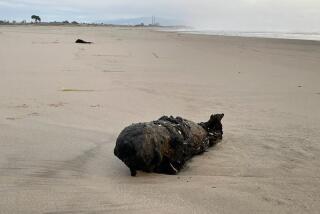Scud Missile Bound for Collector Is Seized
- Share via
PORT HUENEME — Amid the bananas and imported cars that roll through the quiet Port of Hueneme came a bit of unexpected cargo: an operational Scud missile.
The Russian-made missile, which gained notoriety in the 1991 Persian Gulf War, arrived earlier this month via cargo ship for a weapons collector in Northern California but was quickly confiscated by U.S. Customs Service officials, port spokesman Kam Quarles confirmed Friday.
“During the course of their inspections, [customs agents] spotted this and found some things wrong,” Quarles said.
The missile and its launch platform, which arrived Sept. 2, had never been “demilitarized”--meaning that the missile’s working parts, including the engine and trajectory instruments, were not dismantled as required by law.
The missile was not armed.
It has since been removed from the Ventura County port and taken to the nearby Point Mugu Naval Air Weapons Station for inspection, customs officials said.
According to officials, the missile had been licensed for transport by the Bureau of Alcohol, Tobacco and Firearms, but paperwork that listed it as “demilitarized” had been falsified.
Authorities have also questioned the collector, who lives in Portola Valley near Palo Alto, as to why he purchased the missile and whether he knew it was operational.
British authorities also are looking into the firm that sold the Scud and whether it falsified documents for transfer, customs officials said.
Under British law, it is illegal to import such weapons, and officials want to know how and why the collector persuaded the London firm to import the missile and transfer it to him.
The Scud caught the world’s attention during the Gulf War, when Iraq lobbed dozens of the missiles into Israel and Saudi Arabia.
The liquid-fueled missiles have a range of about 310 miles, according to Jane’s Defense Directory, and are in the arsenals of about 15 countries around the world, including Iraq, Iran, North Korea and Syria.
They can be outfitted to carry weapons, including chemical and biological agents, conventional explosives and nuclear arms.
According to Quarles, Port Hueneme serves as the transfer point for surplus military equipment, including weapons, that is destined for museums and private collections.
More to Read
Sign up for Essential California
The most important California stories and recommendations in your inbox every morning.
You may occasionally receive promotional content from the Los Angeles Times.













